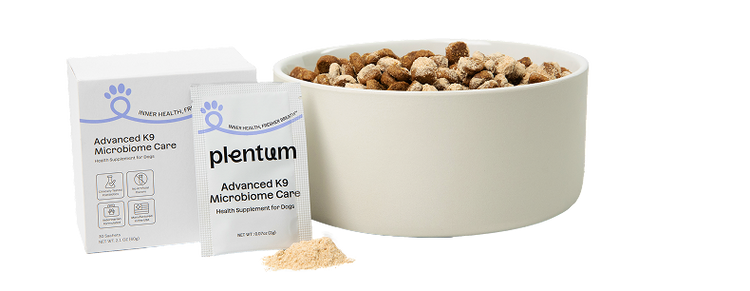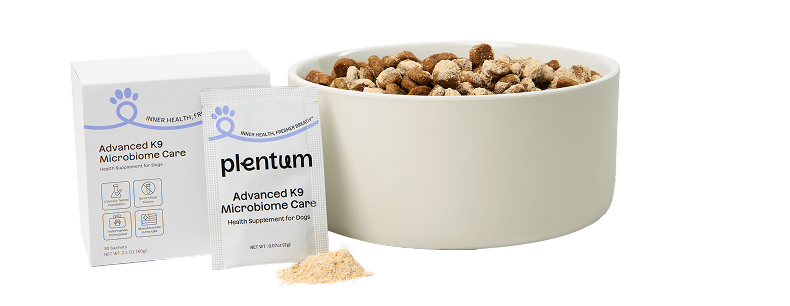
A dedicated dog parent wishes to see their pet live a long and happy life while achieving optimal health. The desire to improve the nutritional health and wellness of pets prompts pet owners to seek various enhancement methods. Proactive pet wellness advocates now consider high-quality dog vitamin supplements to be fundamental support for overall health.
Many available options create difficulties when choosing a dog supplement you can trust. The following guide contains essential, science-based information to help you select dog supplements that provide sustained health benefits for your pet.
Why Your Dog Might Need a Supplement
The AAFCO defines "complete and balanced" dog food through minimum standards that prevent acute deficiency diseases in typical canines. 1 The combination of various elements leads to nutritional gaps, which standard dog food cannot resolve effectively, thus requiring high-quality supplements for complete health support.
The Impact of Food Processing
The manufacturing process used in commercial pet food production leads to significant degradation of nutritional content. The manufacturing techniques of kibble extrusion and canning require intense heat, which can damage or break down vital nutrients in pet food.
- Processing methods lead to significant losses of sensitive vitamins B-group along with Vitamins A, C, and E. AAFCO confirms that heat-based manufacturing processes result in thiamine (Vitamin B1) destruction rates reaching 90%.3
- High processing temperatures cause damage to essential amino acids found in proteins during the Maillard reaction process of heat treatment. Crucial amino acids become unavailable for biological use because they transform into inaccessible compounds, such as lysine.
- The processing of fatty acids results in their oxidation, which leads to decreased nutritional value and produces rancidity in the final product. 2
Food manufacturers restore synthetic nutrients to their products to fulfill standards but these individual substances cannot replicate the complete absorption and utilization process which occurs in whole foods with their natural co-factors and enzymes. Over-formulation techniques, which compensate for manufacturing losses, create a potential risk of nutritional imbalances.
Your Dog's Unique Needs
A "one-size-fits-all" diet fails to consider the distinct requirements of individual dogs. The nutritional requirements change based on several factors:
- The nutritional requirements of puppies differ from those of senior dogs because puppies need more energy and protein to grow while seniors need joint supplements. 6
- Canines who engage in athletic activities and work-related activities consume greater calories, which necessitates additional nutrients for muscle recovery than dogs who lead inactive lives.
- Dogs who suffer from IBD or similar digestive problems cannot properly absorb nutrients from their food despite eating a complete diet.4
Essential Vitamins and Minerals for Canine Health

A dog needs numerous complex vitamins and minerals to perform all body functions. The optimal dog vitamin supplement contains vitamins and minerals that the body can effectively use.
Key Vitamins and Their Benefits
- Fat-Soluble Vitamins (A, D, E, K): These are stored in the body's fatty tissues. The four fat-soluble vitamins A, D, E, and K play essential roles in vision, immune function, bone health, skin and cell health, and blood clotting, respectively.
-
B-Complex vitamins along with Vitamin C belong to the group of water-soluble vitamins because they cannot be stored in the body and need regular replenishment. The B-complex vitamins support energy metabolism and red blood cell production, while also maintaining nervous system health and promoting skin and coat health. Vitamin C functions as an antioxidant to protect the immune system.
Key Minerals and Their Vital Roles
Minerals such as Calcium and Phosphorus act as building blocks for bones and teeth and trace minerals Zinc, Iron, and Copper are essential for both immune system function and oxygen transport.
The effectiveness of a mineral is determined by its bioavailability how well it can be absorbed and used. The body absorbs zinc and copper chelated amino acid-bound forms better than inorganic mineral forms. A dog supplement becomes superior when it includes chelated minerals.
The Importance of Balance: Avoiding Over-Supplementation
Supplements are beneficial but the "more is better" myth is a dangerous misconception. Too much intake of particular nutrients can result in toxic effects.
- Fat-Soluble Vitamin Risk: The body stores Vitamins A, D, E, and K, leading to dangerous toxic accumulation of these substances. The toxic effects of Vitamin D pose serious risks to the kidneys and can result in fatal outcomes.
- Mineral Imbalance: Supplementing with too much of one mineral, such as calcium, interferes with phosphorus absorption and results in skeletal complications.
- Never Use Human Vitamins: Human dietary supplements contain dosages which are toxic to dogs and contain dangerous ingredients like xylitol which proves fatal to canine health.
Consult with your veterinarian before initiating any new supplement program because these risks demand medical evaluation. Your veterinarian will determine the proper dosages and safe treatment approach for your dog.
How to Choose a High-Quality Dog Supplement

A superior dog vitamin supplement achieves its quality through both the inclusion of beneficial ingredients and the exclusion of detrimental ones. Here’s what to look for.
Read the Label: Avoid Harmful Additives
A high-quality product is built on "purposeful ingredients." Be wary of labels that include:
- Common Fillers: The combination of corn, soy and wheat serves no nutritional function and frequently triggers skin itching and digestive problems in dogs.
- Artificial Preservatives: Chemicals like BHA and BHT are used to extend shelf life but have been linked to serious health issues. The U.S. National Toxicology Program identifies BHA as "reasonably anticipated to be a human carcinogen," and research indicates BHT acts as a tumor promoter. The European Union has banned or strictly controlled BHA usage in certain food products, although it remains permitted in pet food in the United States.
- Hidden Sugars & Artificial Colors: The nutritional components of Red 40, Yellow 5, and corn syrup, along with artificial dyes, pose risks for obesity and diabetes, yet offer no nutritional benefits.
|
Ingredient Type |
Specific Examples |
Associated Risks |
|
Common Fillers |
Corn, Soy, Wheat, Rice Bran, Corn Starch |
Digestive issues, common allergens, empty calories, weight gain |
|
Artificial Preservatives |
BHA, BHT, Ethoxyquin, TBHQ |
Linked to cancer, liver/kidney damage, endocrine disruption |
|
Hidden Sugars |
Molasses, Corn Syrup, Sorbitol |
The consumption of these hidden sugars leads to diabetes development, weight gain and dental problems and blocks nutrient absorption |
Look for Certifications and Advanced Ingredients
In addition to preventing bad ingredients, look for positive indicators that demonstrate both quality standards and scientific commitment.
- NASC Quality Seal: The National Animal Supplement Council (NASC) Quality Seal [9] is the gold standard. This certification proves the company achieved a thorough third-party evaluation which confirmed their strict adherence to quality management practices and labeling requirements and their ability to track adverse events.
- GMP Certification: The manufacturing practices under Good Manufacturing Practices (GMP) follow similar standards as those for human products. Supplements that hold this certification undergo consistent production in sterile environments, which maintains the purity and potency of every product batch while ensuring safety standards.
- The most advanced supplements go beyond basic vitamins to promote the health of the microbiome, which encompasses the diverse microbial community residing in the gut. The establishment of a balanced microbiome serves as a fundamental requirement 10 for both immunity and total body health. Consumers should select supplements that contain probiotics: live, beneficial bacteria that support gut health. Evidence-backed strains include Lactobacillus rhamnosus (LGG), which has shown long-term immune-modulating effects in dogs with atopic dermatitis, and the highly stable Bacillus subtilis, which improves nutrient digestibility 11 and fecal quality.
- Prebiotics: The "food" that helps beneficial bacteria thrive.
- Postbiotics: The beneficial compounds produced by probiotics. These stable, powerful ingredients directly support immune function and gut health.
Conclusion: Empowering Your Choice for a Healthier Dog
Selecting the right dog vitamin supplement serves as a strong preventive measure that promotes your dog's wellness. You can select a suitable dog supplement by understanding supplement needs and identifying essential nutrients and high-quality product characteristics.
When selecting a dog supplement, choose one that contains no harmful ingredients or preservatives while also having NASC Quality Seal certification and utilizing advanced ingredients such as chelated minerals and biotics. Your main responsibility should be to work with your veterinarian to develop a customized holistic health plan that suits your pet best. Evidence-based choices made today will result in a healthier and more vibrant future life for your canine companion throughout multiple years.





